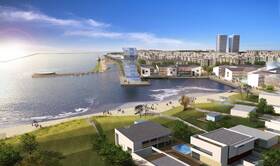Almere is a multinuclear New Town, some 20 km east of Amsterdam, founded by the Dutch government in 1971, presently housing some 190.000 inhabitants. Almere is located in Flevoland, part of a major water management and land reclamation project, known as the Zuiderzee-project, which Dutch government decided on in 1918 and has been developed ever since. The former sea has been transformed into a freshwater basin of some 2.200 sq. km and into some 1.700 sq. km of new land. On this newly reclaimed land 18 villages and 3 New Towns (Emmeloord, Lelystad and Almere) have been developed since the 1930s.
Almere has been directed by the national government to expand the city with 60.000 houses and 100.000 jobs, to be realized by the year 2030. Almere uses this ambitious scenario of doubling the city to realize a complete city, that is to transform the typically monofunctional New Town to a town with a balanced demographic profile, a wide offer of housing and working environments and a full range of facilities including higher education and the ecological restoration of the surrounding nature, all in a sustainable way. A large part of this extension will be planned by the use of experimental methods, aiming to create a city that is just as much shaped by its inhabitants as by its planners. Almere calls this ‘The Organic City’. The theme of Organic Planning was introduced by alderman Adri Duivesteijn as one of the main goals for the future growth of the city.
This large-scale expansion of Almere is exceptional and rare, both in the Netherlands and in Western Europe. The only precedents for this are the quickly expanding economic areas in Asia. To exchange knowledge and experiences on planning tools for the sustainable city the International New Town Institute organizes an exclusive round table meeting for both Chinese and Dutch experts and those who would like to become experts on green cities.
The ecocity is now firmly on the agenda the world over. Almere launched its 7 Principles based on the Cradle to Cradle filosophy, Caofeidian in China tries to controll the salt water by implementing an islands-and-wetlands approach. Yet for those regions where new cities are actually being built no viable model for its design seems to exist. In aggressive market environments in countries like China, current models fail to deliver both speed and flexibility. At the same time, these environments preeminently offer the laboratory conditions in which new ecocities have a chance to be developed and tested. In the expert meeting ’Green From Scratch’ Chinese and Dutch professionals discuss the contradictions between the fragmented and short-cycle investment climate and the long-term integrated visions needed for urban sustainability. A time-based planning approach seems to become essential to unlock a whole range of problems that are currently hampering the progress of eco-planning. Could new organic organizational models e.g. the Organic City in Almere and virtual planning tools, such as evolutionary planning, offer new opportunities to realize green cities?


